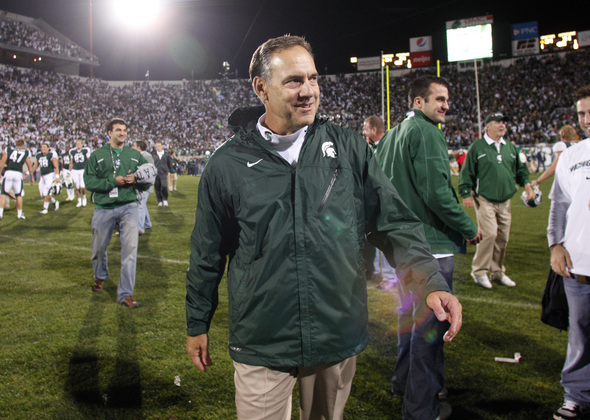Health a concern, not necessarily a priority, for college football coaches

Shortly after an overtime win over Notre Dame, Michigan State coach Mark Dantonio had a mild heart attack and was hospitalized Sunday morning.
AP photo
When Bo Schembechler told his assistant coaches of his intentions to retire following the 1989 season, they asked him to reconsider.
“We said, ‘Hey, we’ll do the work and you just stay here,’” said Jerry Hanlon, the Michigan coaching legend’s longest-serving assistant. “Bo said, ‘If I can’t fully coach, I’m not going to do it, and the doctors said I shouldn’t.’”
For the better part of his career, Schembechler walked a tightrope trying to balance football and health.
He suffered a heart attack on the eve of the Rose Bowl in 1969, underwent bypass surgery in 1976 and endured another heart attack in 1987. By the end of his tenure, he had to pick one or the other.
“It is debilitating, the time, effort and stress,” Hanlon said of the coaching profession. “Doctors told him he better get out. It wasn’t easy for him to do.”
Decades later, coaching remains a high-stress profession.
Whether that stress played a role in the heart attack of Michigan State coach Mark Dantonio, 54, last Sunday is unknown. But Dantonio’s health scare served as a wake-up call for his colleagues.
“I think we all cognitively know there are things more important than football, but it’s a reminder,” Ohio State coach Jim Tressel said. “I guess I would just call it a very real reminder.”
Whether it spurs them to change some habits is a tricky question. Coaches have never been mistaken for keeping bankers’ hours.
Under Schembechler, the Wolverines coaches typically started at 7 a.m. or 8 a.m., took a 45-minute dinner break with their families, then came back to their offices to study film.
They kept that schedule Monday through Thursdays during the season. On Friday nights, they stayed with the team.
“Those were good 15, 16 hours days,” Hanlon said.
Now, those might be viewed as good old days. As the 24-hour media cycle developed and early-commitment recruiting period was born, the in-season demands on coaches have intensified.
“I am surprised it doesn’t happen more often,” Purdue coach Danny Hope said of incidents like Dantonio’s. “The game has gotten a lot bigger in the last 10, 15 years, now to the point where, if you are a coach at the BCS level in 2010, it becomes just about life-consuming.”
Starting in August and going through Christmas, he said a 100-hour work week is not out of the norm. Eighty hours would be a light week. He might get one day off during that time.
A lot of coaches intend to find a balance between work and personal life, but in practice, it’s elusive. Hanlon said Schembechler changed his diet and exercise habits, but never his workload.
Tressel said he and his coaches could stay in their offices 24 hours a day during the season and not finish their work.
“I’m not sure I’ve ever been accused of having a proper balance,” he said. “I try to exercise some and get as much rest as I can. The problem is you always have something to do.”
Penn State’s Joe Paterno has endured the stresses of the profession longer than most. But the 83-year-old has also made exercise a priority throughout four-plus decades in Happy Valley.
“Until the last year or so, I have always been a great walker,” he said. “I used to walk five or six miles every morning, and I think that’s held me over.”
Other coaches ensure their assistants leave the office for time with their families each week.
Indiana coach Bill Lynch explicitly said he doesn’t want his staff working all night, and he sends them home early Tuesdays to make sure they spend time with their families.
“That, as much as anything, brings balance to your life,” he said. “I raised kids myself. If you let (football) consume you, you miss opportunities with your kids.”
Tressel encourages his staff to leave the office by 10 p.m. “Nothing good happens past 10 at night,” he said. “With coaches, any idea you come up with after 10 probably won’t work.”
Hazards of their profession are under scrutiny following Dantonio’s heart attack, as well as Florida coach Urban Meyer's health scare in January -- he briefly resigned before returning. But to a coach, they noted stress and long hours aren’t unique to coaching.
“One thing I learned in the 80s is that you can’t control what the weather does, and if you’re a farmer, that comes with some stress,” Iowa coach Kirk Ferentz said.
“You try to watch what you eat, be careful about your living habits and get as much rest as possible and go from there. There are certain things that can be avoided, and some that are part of the deal.”
Pete Bigelow can be reached at (734) 623-2556 or e-mailed at petebigelow@annarbor.com. Follow him on Twitter @PeterCBigelow.


Comments
michboy40
Thu, Sep 23, 2010 : 8:14 p.m.
I can't imagine the sress that comes with being the front man for a major college football program. The money, the attention, the lack of control over what your players are doing off away from the field, the scrutany...Yikes
MikeB
Thu, Sep 23, 2010 : 4:45 p.m.
Tough job - having said that I am really glad Coach Dantonio is back home and doing well!